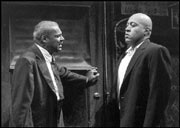JITNEY
Seattle Center, Seattle Repertory, 443-2222, $10-$44 7:30 p.m. Tues.-Sun.; 2 p.m. matinees Sat.-Sun. ends Sat., Feb. 23
WHAT YOU NOTICE in Marion McClinton’s production of Jitney, about a community of souls at an unlicensed cab service, is the sound of its characters: the weary rumble of Becker (Roger Robinson), the head of the company, beating back the imminent demise of his enterprise; the alcoholic rasp of Fielding (Anthony Chisolm), a soused driver with a drowned heart; the prideful bassoon of Becker’s estranged son, Booster (Keith Randolph Smith), who shows up midway through the piece after having served 20 years in prison for murder. August Wilson’s recently revised version of his first play unleashes the cries of these and a half dozen other African-American citizens of Pittsburgh’s Hill District in the ’70s, and the success of this affecting piece at the Rep is that McClinton’s show has the real throb of human voices.
“You don’t even know where your debt begins,” Becker replies when Booster insists he’s paid his societal dues. It’s just one lingering truth of a play in which the words sing out the toils and generational unrest of its people while avoiding stilted pedagogy. The mounting tribulations of Becker (with a searing Robinson on slow burn) and his drivers as they battle their broken dreams unfold like stories to which we’ve been granted intimate, fly-on-the-wall access. When a frustrated Youngblood (explosive Russell Andrews) has it out with his doubting love, Rena (Yvette Ganier, subtle and sharp-witted), the pain feels real because McClinton never cheapens it by telling us which way to lean.
The production runs long—Wilson can be long-winded, and things can get big and yammery when arguments break out—but it never loses our interest. The crackling, comic group repartee keeps giving way to bravura two-person scenes. It’s an obvious device, perhaps, and you can always feel a monologue coming on, which would be trying if Wilson’s ear for the music of everyday speech were not so consistently compelling and true—his colloquial arias are as close to the careless rhythms of life as theater this purposefully lyric can be. And Wilson can throw a curveball at you when you least expect it. He has an unerring way of shifting allegiances without comment, as if he’s listened so keenly to each disparate argument that he sees beyond the concept of taking sides; Booker’s passionate defense of his vengeful crime is a stunner worthy of James Baldwin.
Stephen McKinley Henderson, who has the most colorful lines, excels as meddling old owl Turnbo, who spends most of the day spreading gossip, an amusing practice that explodes into drama within the ranks. “I just talk what I know,” says Turnbo. It’s our great good fortune that Wilson, McClinton, and the cast do, too.








